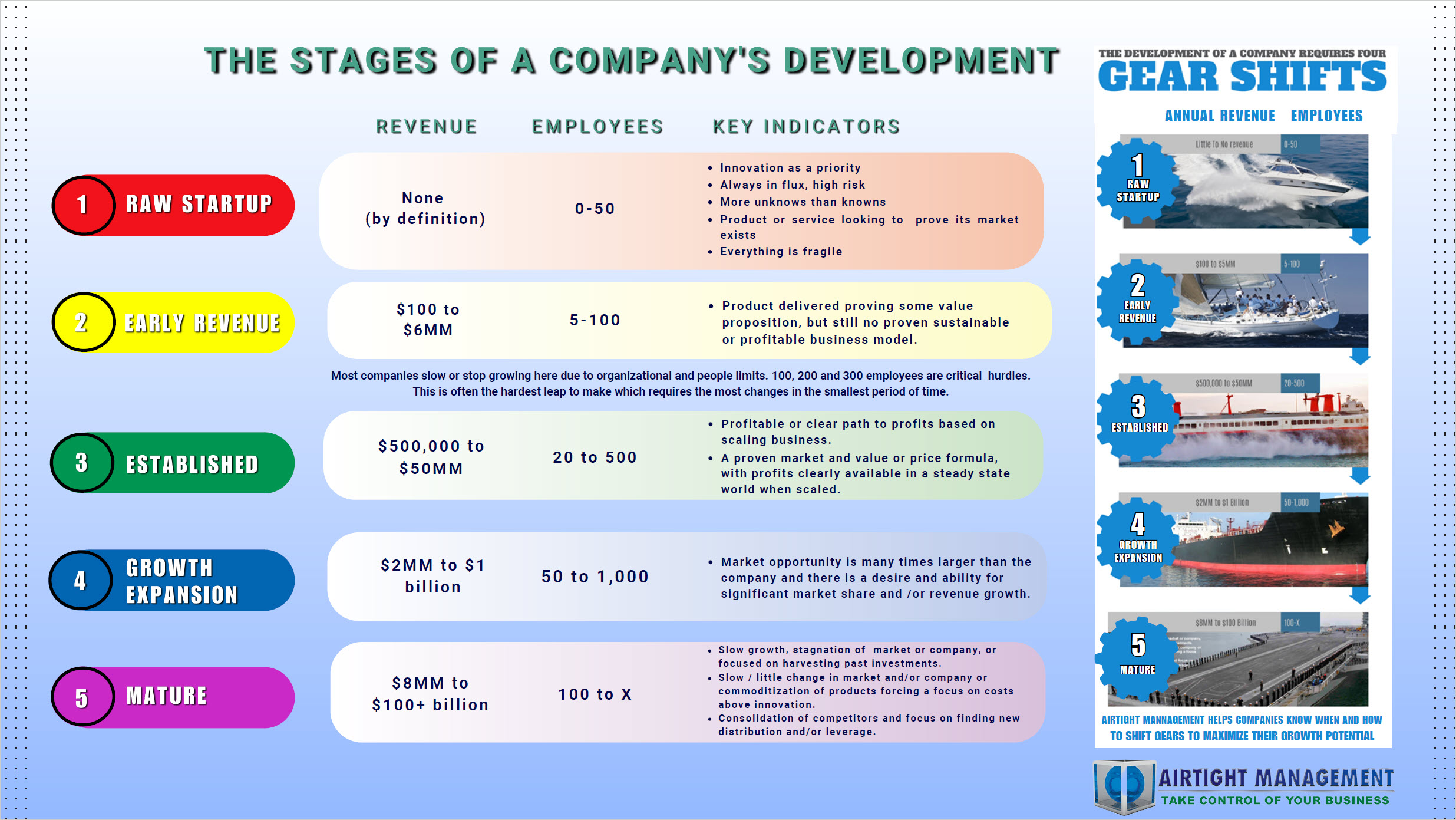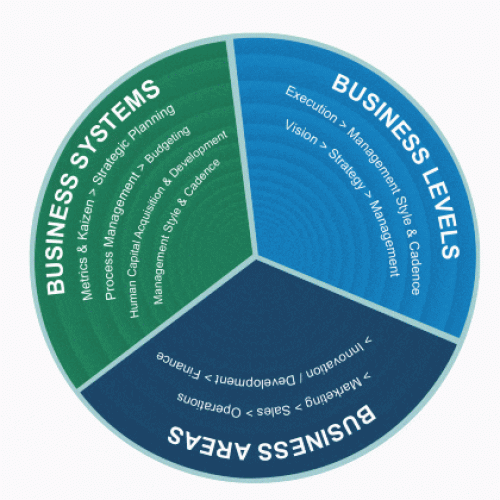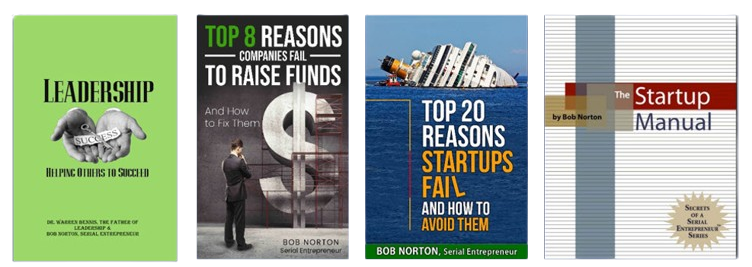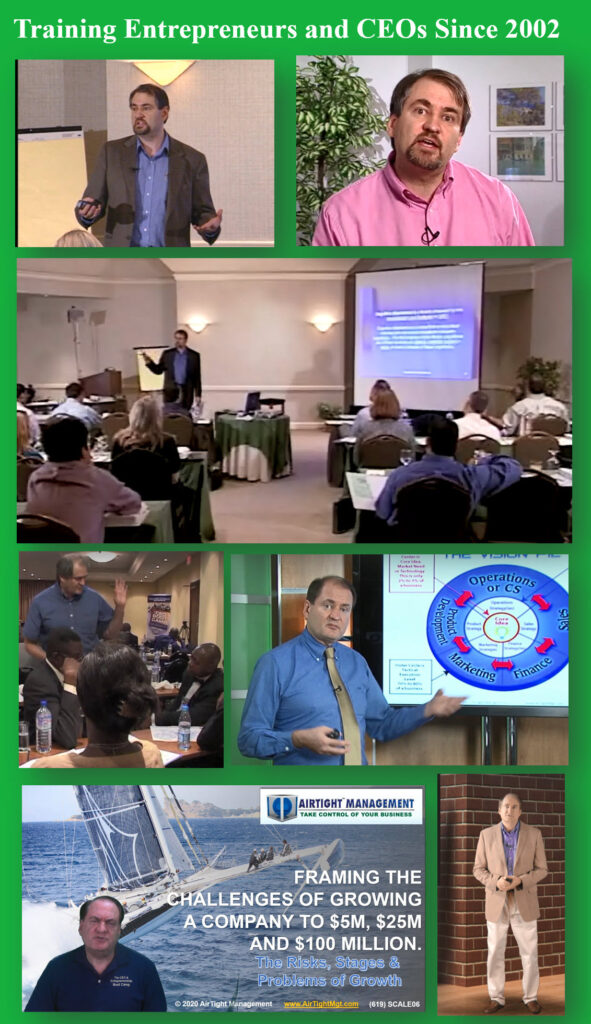Leadership Lessons For Emerging Growth Companies
A mini-series on practical leadership focus for start-ups and
emerging growth company senior executives
This is the first of a 5-part special series
This series will explore how leadership focus and skills must evolve as a company grows from a raw startup to a successful enterprise in an expansion stage. Most seminars, texts, and articles talk about leadership generically, as if it had the same requirements in all situations. It does not, and in fact, the key elements of success at each stage of a company’s development are always very different.

Leadership is a skill that is hard to develop but usually easy to recognize. It is an ability some are born with, but it also is one that anyone can develop with some guidance and practice. Usually you need the outside perspective of someone without any agenda or bias to improve. We all are unaware of things about ourselves that everyone else is aware of. These things must be identified and improved to be a successful leader. No leader can lead without intimate self-knowledge and insight.
Like many decisions and other things, leadership style and many key decisions are very dependent on your company’s stage of development. Doing something one way might be very appropriate at a raw startup, but doing this same thing would be a big mistake at a more mature company. Let’s examine how the focus of leadership must evolve as a company grows.
A leader in a large company spends lots of time making speeches in front of large groups and talking to the media. The messages must be enormously simple and repeated constantly. To be carried accurately through many levels and/or other people, they are “dumbed down” to the simplest possible core message. The message must often speak to the least common denominator.
President Bush is a master of these “simple stupid” messages. Howard Dean said on Meet the Press that Bush is a master of saying the same simple message four times a day for twenty days. We could debate why, but at that level of communicating to 350 million Americans and six billion people worldwide, it may be the only effective way.
A leader in a small startup, however, is a “hands-on,” show-them-how-to-get-it-done person. This is the other end of the spectrum, with lots of time to communicate with each individual one-on-one, and many complex messages are needed. Leaders in small companies must demonstrate lots of specific domain expertise that gives people the confidence to join in and follow them towards a vision they can not see or fully understand themselves. They must trust that the leader sees and understands this vision, because the leader has more knowledge, experience, and wisdom. Most people are followers; I believe this was an evolutionary imperative to allow humans to form social groups and survive. The alpha wolf of the wolf pack, right or wrong, causes things to happen, and action is more important than being right every time. In any complex world, some amount of trial and error is necessary.
At this early stage the leader’s specific domain expertise, experience, and wisdom are experienced one-on-one. Personal charisma plays a role, as do their communication skills and style. It can be much harder to lead a small team of good people than it is to lead a larger group from afar. Being there, you are subject to the close scrutiny of the people you are leading every day. Large company leaders and politicians have many layers of protection and can expose only what they want to the masses. Small company leaders have day-to-day personal contact and must continue to build or maintain respect with each interaction. Good leaders in small companies create a team approach with a flat organization where everyone can communicate freely with everyone else without formal organizational hierarchy.
We will use the five-stage company development model below to explore how leadership evolves from a raw startup to a mature company. I use this model as a key element in all advice given to CEOs, and all our products are rated for particular stages. This is because the answer to any question can literally be 180 degrees different for a stage #1 company than for a stage #3 company. Select where your company is here before proceeding. Then we will explore key leadership attributes needed at each stage of company development.
Leadership Attributes Needed at All Times
Consistency and leadership by example are needed at all stages. No one is going to follow a leader for long who says one thing and does another. This is foundational to forming trust and respect with people. At the same time, people will always criticize what they do not understand when it is above their ability to understand it. This Monday morning quarterbacking is also a fundamental problem in leadership at any size company.
Most employees have no idea what a CEO does day-to-day, and some even think we sit in our office all day enjoying ourselves and collect the big paycheck because we are lucky, know someone, or are just plain politically savvy. They discount the intelligence and drive needed. They have never, and will never, understand the experience, talent, work, risk, and hard decisions needed to grow a business. Few employees will have the commitment and be willing to make the sacrifices needed to found and grow a company. This must just be accepted as a reality and understood.
Decisions CEOs make are more complex than most people will ever be capable of understanding, and we need to understand and empathize that this stuff is WAY above most people’s ability to grasp it. Individual contributors will only understand one area of the business well, and they will see everything a CEO does differently through those glasses. They can not possibly weigh decisions appropriately, taking into account the other five or six disciplines needed to make a good decision. CEOs must understand eight to ten areas of the business 50% as well as any employee who does that job. These include sales, marketing, finance, product development, operations, management, people, hiring, and other areas. Therefore, we need to know literally five times as much as anyone else and integrate that balancing act of factors to do the best we can for the higher-level corporate objectives.
This issue needs to be managed very well by a good leader. I have often spent several meetings with managers over many weeks to have them understand issues better when I knew immediately from experience what the correct decision was. If I dictated this decision without them understanding why, I would be viewed as a dictator and probably also as incorrect and egotistical. This would inevitably lead to discontent among the managers and others. This perception would be incorrect because I was better qualified to make that decision. However, it would be the only information they had to go on, and hence their perceptions would become reality in their minds and likely also the minds of others.
This is not meant to be a “no one knows the trouble I have seen” kind of sympathy play but is just a harsh reality of the knowledge base a CEO must have as compared to others in the company. CEOs are certainly not always right, but they do have the broadest perspective on the business for decisions that impact the entire company. However, they should often defer to specialists in many areas when the decisions are more tactical and not influenced by knowledge from other areas of the business.
Attributes all leaders must project at any stage of a company’s development:
- Integrity – few senior people will follow a leader without testing their integrity, honesty and transparency
- Domain expertise, or knowledge of the industry area the company is launching into
- Management experience, and ideally, past success launching products or companies. A CEO with past experience can recruit and raise capital far easier than one without this experience.
Visionary Thinking with Strategic Focus
The CEO must define a clear and compelling vision for the company’s future, backed by strategic priorities.
They must communicate this vision repeatedly and effectively to investors, team members, and early adopters.
Crucial for setting direction, aligning teams, and differentiating in a crowded market.
“If you don’t know where you’re going, any road will get you there.”
2. Relentless Execution & Resource Prioritization
Startups live or die by speed and discipline.
A successful CEO can prioritize ruthlessly, allocate limited capital and time, and get things done fast.
This includes knowing when to build vs. buy, hire vs. contract, and launch vs. iterate.
Execution is strategy — especially in startups.
3. Talent Magnetism & Team Leadership
The ability to attract, inspire, and retain top talent is indispensable.
Early-stage companies can’t afford mediocre hires — the CEO sets the tone for culture, pace, and accountability.
Empathy, clarity, and the ability to develop others amplify execution across the org.
“First who, then what” — Jim Collins
4. Capital Strategy & Investor Communication
Raising and managing capital is one of the CEO’s core responsibilities.
Requires strong storytelling, metrics fluency, and the ability to build credibility with institutional and angel investors.
A poor capital strategy or weak investor relations can kill even the best ideas.
The CEO is the company’s top salesperson — to investors, employees, and customers.
5. Grit, Self-Awareness & Adaptability
A startup CEO will fail constantly — with customers, team members, and the market.
The best CEOs are mentally tough but also self-aware, coachable, and willing to pivot fast without ego.
They balance conviction with humility and data-driven feedback with decisive action.
“Success is going from failure to failure without losing enthusiasm.” — Winston Churchill
Click on Your Company's Stage of Development Below Using this Boat Size Metaphor
Each stage has very different needs and a different management style. You must "shift gears," giving up what worked before at each previous stage. This is why many founders are replaced by "professional managers and CEOs." They do not adapt. And why more than 99.75% of founders get stuck between $1M and $10M in sales?
Click on your stage company's below to learn more and get free resources for your current needs.
STAGE 1:
Raw Startup - No Revenue yet
Just a couple crew members. Ideation stage and developing a product or service.
STAGE 2:
Early Revenue But Under $1M Annually
3 to 7 crew members. Some traction with paying customers.
STAGE 3:
Established - 7+ employees
Typically, $1M to $10M in Annual Sales but growing slowly.
STAGE 4:
Growth Expansion - Usually 25+ Employees
Sales typically over $2M+ and seeking to grow at 30%+ annually.
Are you ready to scale at 25%, 50%, or 100%+ CAGR? Get a scaling audit today. We will identify all the limiters to your growth and how to fix them.

Running a business is easy! Growing a business is not!
Call to get industry-specific case studies.

Call (619) SCALE06, (619) 722-5306 from 9am to 6pm CT.
Or Click Here to Schedule a Complimentary Scaling Assessment
This is not a sales call but an assessment of your company's ability to scale and eligibility for our $10 million guarantee. In any event, we will guide you towards greater success. We will study your website and other materials in advance.

Bob Norton, Our Founder and CEO oversees all engagements
Mr. Norton founded and sold four companies for over $1 billion total, returning a 25X ROI to investors. He has helped hundreds of companies as a trusted adviser, fractional CEO/COO and Board of Director member. He also created The CEO Boot Camp and has trained thousands of CEOs from over 45 countries.
Subscribe to get access to our many free resources including:
- Over 50 Videos
- 12 on scaling companies
- CEO Resources newsletter
- CEO Tools
- Notices for free webinars
- Free eBooks:
Bob's Books

New free ebook coming soon on filing provisional versus standard patents. When each is best.



